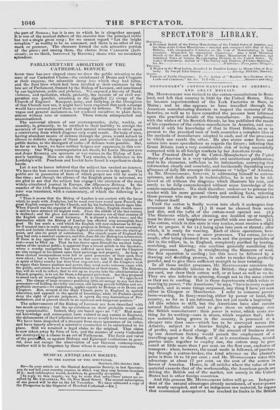PARLIAMENTARY ABOLITION OF THE CATHEDRAL SERVICE.
SOME time has now elapsed since we drew the public attention to the state of our Cathedral Choirs—the enrichment of Deans and Chapters at their expense, the miserable decay into which they had fallen, and the final blow which had been levelled at their existence by the late act of Parliament, framed by the Bishop of LONDON, and sanctioned by our legislators, noble and plebeian. We exposed a history of fraud, violence, and spoliation, which, probably, the records of no civil cor- poration can parallel, attaching to the dignified 0) clergy of the Church of England. Rampant, noisy, and bullying, as the champions of that Church now are, it might have been expected that such a charge i would have aroused one of them to attempt its defence. We dealt n no vague and general declamation, but confined ourselves to plain facts, almost without note or comment. These remain unimpeached and uncontradicted.
, The universal silence of our contemporaries, daily, weekly, or monthly, is. primarily, to be ascribed to their inability to arraign the accuracy of our statements, and their natural reluctance to enter upon a controversy from which disgrace only could result. .No body of men, having abundant means of defence through the press, would submit in silence to definite charges of fraud and pectilation--of the violation of public duties, to the disregard of oaths—if detbnce were possible. But, as far as we know, we have neither helpers nor opponents in this con- troversy. Our Whig contemporaries are dumb, for Lords MELBOURNE and JOHN RUSSELL are sponsors or wet-nurses to the Bishop of Lox- DON'S bantling. Mute are also the Tory oracles, in deference to his Lordship's will. Peach= and Loekit have found it expedient to shake hands.
Let it not be hence inferred that the subject has excited no interest. We have the best means of knowing that the reverse is the truth. The public are in possession of facts of which proper use will be made in due time ; and though the silence of the English press is universal, we are glad to see that the subject has engaged the attention of the most widely-circulated journal in Europe, the Allgemeine Zeitany. In the number of the 13th September, the article which appeared in the Spec- tator was translated, with a commentary, of which the following is a portion. " Thus it seems that the Bishop of London is mit content with the havoc which he made with ..Eschylus, but he must now turn round upon Purcell, the great English composer for the Church, and lay his barbarian hands upon him. When Purcell was the organist of Westminster Abbey, English church music is said to have attained its highest rank. From the middle of the last century it declined ; and the glees and canons of that country are all that remains of the English school of vocal harmony. It is almost a tabula ruse; and the destruction which the Bishop of London has effected may accomplish final good lie has made a void which the English will now endeavour to fill up ; for if musical taste is really making any progress in Britain, it must necessarily reach and include church music—the highest elevation of the art—its starting- point, and also its point of culmination. The church music of England has long had only a nominal existence, and this sham life the Bishop has terminated. If there is any appetite for the art in that country, this void—now become real—must be filled up. That he has drawn upon himself the merited indig- nation of the musical public, is apparent from a recent article in the Spectator, where a worthy castigation has been inflicted upon him ; and the Chapters are also enraged at his attack upon their patronage and property. As long as these clerical incorporations were left in quiet possession of their spoil, they were silent ; but a higher Church power has now laid its hand upon them. A spirit of bitter enmity has thus been engendered ; and if the Chapters wish to regain their former position and power, they must make common cause with the public, and return to an honest administration of their trusts. The Bishops, too, will do well to reflect, that to stir up an inquiry into the administration of Church property, is to set, for them, a dangerous precedent. Are they prepared to stand such an investigation when applied to themselves? We apprehend not. The charge of large revenues producing little advantage to any but their possessors—of holding unwieldy sinecures, and having proved faithless and un- profitable stewards—we conjecture, applies equally to Bishops as to Deans and Chapters. But, arrayed as the MO Church party in England is, against education, and opposed to the spread of knowledge, while its Prelates openly deny the right ot private judgment, it upsets the very foundations of Pro- testantism, and at present stands in an equivocal and dangerous position."
The achievements of the Bishop of Losnox are here described with too much accuracy ; hut the speculations on their probable result are very questionable. Indeed, they are based upon an "if." Had musi- cal knowledge and consequent taste existed to any extent in England, the debasement of the Cathedral service never would have been suffered. We have been despoiled of a treasure from mere ignorance of its value, and have tamely allowed a miserable counterfeit to be substituted in its place. Still we retained a legal claim to the original. That claim is now taken away by form of law, and the statutes of every Cathedral are destroyer by a clause in an act of Parliament. The force and value of the preceant, as against Bishops and Episcopal institutions in gene- ral, does not escape the observation of' our German contemporary, neither will it be forgotten by those whom it more nearly concerns.


























 Previous page
Previous page